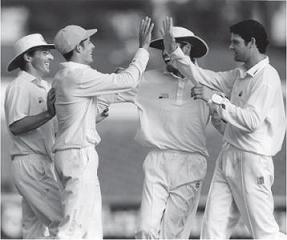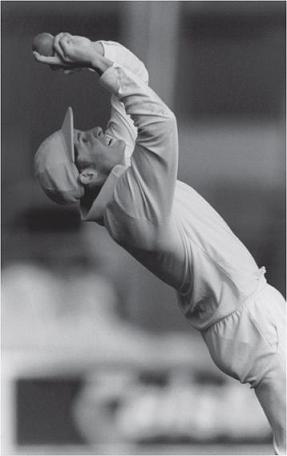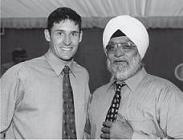Mr Cricket (21 page)

 Use it as a positive (this is preparing me for Test cricket, this is great practice, this is a great challenge)
Use it as a positive (this is preparing me for Test cricket, this is great practice, this is a great challenge)
 After every good game, write down how I felt â everything about how I felt.
After every good game, write down how I felt â everything about how I felt.
Vic helped me a great deal and I was interested in everything he said. He gave me some other tips, about distractions. He advised me to go to the ground the day before a match, walk out to the middle and take a look around. He said it was inevitable there would be distractions, whether it was a bright-coloured sign, or an electronic scoreboard there that would be playing replays or highlights while I was out in the centre. He believed that if you'd seen those things the day before, when you're not in the heat of the moment and trying to concentrate, you can get them out of your head when you need to.

It made perfect sense, though I later realised that distractions weren't a big problem for me. In my first match for Australia, a one-dayer against India in February 2004 at the WACA, we needed about 35 to win when I came out to bat. Amy said to me afterwards: âWow, what about the roar you got from the crowd!' I told her I didn't really notice it. I heard the crowd when I came out, but it seemed like the noise was coming from miles away. I thought later that maybe that's the fabled âzone' that sportspeople talk about, where you could have a nuclear bomb go off and you wouldn't notice it because you're so focused on the job you have to do. Nevertheless, whenever we train at the ground on which we'll be playing, I follow Vic's advice, go to the middle and have a look around for any potential distractions. Vic's input has had a very positive effect on my career and complemented perfectly the knowledge I gained from Sandy.
The end result of what I learned from both of these terrific men â and many other good people I've come across â was the formulation of a list of headings and points that made sense to me and I know are a formula for success. I call it âMy Gospel'. It is, effectively, a definitive list of things I've learned over the course of my whole career that I know have helped me to reach the point I'm at and must be followed in the future for me to be able to stay successful.
My Gospel comes from years of writing down notes on how I thought I was performing, how things were unfolding around me, experiences and discussions I had with many different people and also from things I'd read: Mark Taylor, Michael Johnson, Lance Armstrong. As I was reading, each time I came across an explanation of a tactic that these sportsâpeople had used to become successful, I thought, âIf it works for them, why can't it work for me?'
My Gospel was only finalised quite recently. The final draft was completed in 2003, after I'd come out of my bad patch for WA. It is everything I need at this point in my career. I keep the sheets with me almost all the time and look at them almost daily when I'm on tour. I will keep adding to it with notes concerning new things in my life, such as how to deal with mental fatigue and other demands of the game as they appear. But the basic plan is complete.
MY GOSPEL
GOALS
Set them
Focus on them
Never lose sight of them
I look at my goals everyday and focus on them without straying. I focus on the goals I can control but also on my outcome goals, which you can't necessarily control but should always keep an eye on.
FEARS
Confront them
Never look at consequences
Think positive
Focus on goals
Throughout my whole career I've battled with fears, probably like a lot of other players. So, I find it really important to confront them and say that it is OK to have fears.
Focusing on consequences is something that can happen when you let your fears take over, whether it's a fear of losing, getting out, not scoring fast enough or being dropped. They are consequences, so I'll ask myself again, âWhat are my goals? What can I control?' That's what gets me out of negative thinking and focusing on the things that I can control.
COMITMENT
Be self-disciplined
Hard work = results
100% effort 100% of the time
No excuses
No shortcuts
What is your goal?
Commitment is something I've never really had to worry much about. Even though I might not have to focus on commitment as much as others, it is still important to remind myself that it is a vital ingredient. Commitment means hard work and training at 100 per cent intensity.
BASICS
Do them well
These are the building blocks
Good habits at training
I think the thing that gets you through the most difficult situations is the knowledge that you've done the basics very, very well at training. And you understand very well the basics of your game and you can stick to them. That's what you have to be able to rely on when the going gets tough. That's when the basics of my game â being tight, being patient, defending and working the ball into the gaps, becomes very important.
LEADERSHIP
Lead by example (hard work and discipline)
No excuses
Strong in my beliefs
I found that leading by example is a key thing. Train well, do the little things well and people will see that that's what you expect of them. Not making excuses is a vital point to instil in your players because it's so easy to make excuses about why you or they have performed badly. There's no room for that. Being strong in your beliefs is important. When I was given the chance to captain I realised that the rest of the team were looking to me to be strong in my beliefs and wanted to follow me. I'm big on explaining exactly what I think. A player or players might not agree with my decisions, but it's the way we are heading and I have to ensure that, as a captain, that is understood by the players.
CONFIDENCE
Comes with proper practice
Clear mind and not questioning yourself
Learning to relax
When I'm batting my best, in peak form and exuding confidence, my mind is 100 per cent clear without clouds or bad thoughts and I'm playing naturally.
DISCIPLINE
Do what has to be done
When it has to be done
As well as it has to be done
Do it that way all the time
I thought this summed up discipline very well.
MENTAL TOUGHNES
Never give in to yourself
Be honest with yourself
Disregard outside influences and focus on what's important
Be happy where you're at
The secret of batting for me is to be able to take everything out of your mind, clear it completely and no matter what the situation, no matter who's bowling or what the pitch is doing, nothing matters except the ball coming out of the bowler's hand. If you can separate everything from your mind and see that ball as clear as day coming out of his hand, then â physicality aside â you are giving yourself the best chance. If you can look at yourself in the mirror and say âI gave myself the best chance because I had nothing going through my mind and was completely focused on the ball coming at me' that's what being mentally tough is all about.
I produced my gospel for two main reasons: firstly, I believe it is an asset that coaches could use to help young players perfect their game. Coaching is a profession I am interested in and if I become a coach in the future, I will use my Gospel as one of my tools. Secondly, it is a blueprint I can turn to when things aren't going well. I know I can come back to it and check off whether I'm doing all the things I need to be doing. If things aren't going to plan, I will tick off each box to work out what areas I have to improve on. I know that if I'm doing all those things properly, I will perform well.

I
t is hard to comprehend just how much my life has changed since I got the opportunity to play Test cricket in 2005. So much has happened in such a short space of time. It's quite amazing. I often say to Amy: âCan you believe what's happened in the past couple of years?' Little more than three years ago, we didn't have any children and I'd played a single match of international one-day cricket. Suddenly, we've got three kids and I'm playing three forms of the game for Australia!
However, when I think about it logically, if everything can come together so quickly, who's to say that it can't be taken away in just as short a space of time? In cricket, a stretch of poor form or injury can hit at any moment and could change everything. No matter how well you think things are moving along, there are no hard and fast rules when it comes to bad luck. Plenty of top sportspeople have been cut down in their prime due to factors outside of their control and, although I am enjoying a golden stage of my career right now, there is no way of telling what could be waiting just around the corner. That is one major reason why I have started to take a stronger interest in expanding on opportunities for whenever my sporting career might end.
Playing for Australia provides you with the chance to build relationships beyond cricket. We meet all sorts of people from various walks of life and many are interested in forming an association that can work to our mutual benefit. It's an aspect of the game that is quite new to me, given that my career has taken off relatively recently, but one I've become interested in exploring. I've come to learn that there is a lot more to playing international cricket than just training and playing and I want to enjoy the entire experience.
